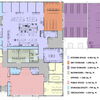Processing Your Payment
Please do not leave this page until complete. This can take a few moments.
- News
-
Editions
View Digital Editions
Biweekly Issues
- December 1, 2025
- Nov. 17, 2025
- November 03, 2025
- October 20, 2025
- October 6, 2025
- September 22, 2025
- + More
Special Editions
- Lists
- Viewpoints
-
Our Events
Event Info
Award Honorees
- Calendar
- Biz Marketplace
Survey: Small business disruption has skyrocketed during health crisis
 Photo / Maureen Milliken
Small businesses are feeling the pinch from coronavirus restrictions. A National Federation for Independent Business survey found that by March 20, 76% of small businesses had been negatively affected.
Photo / Maureen Milliken
Small businesses are feeling the pinch from coronavirus restrictions. A National Federation for Independent Business survey found that by March 20, 76% of small businesses had been negatively affected.
More Information
The negative impact of the COVID-19 outbreak on small businesses across the U.S. is profound and has skyrocketed in less than two weeks, according to a study by the National Federation of Independent Business.
Some 76% of small businesses surveyed on March 20 reported being negatively affected by the outbreak, a dramatic escalation from the trade association's report of 10 days ago, in which 23% reported a negative impact.
Businesses report slowdowns in sales, supply-chain disruptions and an increase in sick employees. More than half of small-businesses owners have either contacted lenders about financing or plan to, even if they haven't yet felt an impact. Survey responses were not broken down by state.
"The outbreak will leave few, if any, owners unscathed," said the organization, which represents more than 300,000 small businesses across the U.S. "We know the economic impact will be immense and now the question is how long will it last and how quickly can the small business sector recover once on the other side. Small business owners are anxious to seek clarity to both questions."
Changing numbers
On March 20, when the most recent survey was compiled, there were about 17,000 reported cases nationwide. As of March 24, there were 43,600. On March 10, there were 755 reported cases.
To date, there have been no federal restrictions on business related to the virus, and states have taken different approaches, with some declaring a state of emergency and limiting business to essential-only, while others have let businesses decide what to do.
The survey numbers from March 10 to March 20 virtually swapped, with 73% on March 10 saying there was no negative impact to their business. The disruption to sales and number of sick employees has increased, while supply chain disruptions have decreased.
About 5% were positively affected by the outbreak, up 3% from March 10, but that number will likely drop, the NFIB said in a news release. "These firms are likely experiencing stronger sales due to a sharp rise in demand for certain products, goods, and services.This will presumably ease in the coming weeks as consumers feel more secure about their personal supply levels."
Almost all small-businesses owners surveyed are taking action to adjust to their changing economic condition or to protect themselves from potential disruption, the survey found. Just 6% of owners have not taken any action in response to the outbreak, a massive drop from two weeks ago, when 52% said they were not taking action.
Concerns escalate
About 68% of small business owners on March 20 were “very” concerned about the potential impact on their business compared to 16% in the earlier survey. Another 23% were somewhat concerned and 9% were slightly concerned. Just 1% were not at all concerned.
Other findings of the survey:
- Of those businesses negatively affected, 54% had slower sales, compared to 42% on March 10;
- 23% were experiencing supply chain disruptions, compared to 39% on March 10;
- 9% reported sick employees (though not necessarily testing positive for the virus), compared to 4% on March 10.
- 20% of small businesses were not currently affected by the outbreak at the time of the survey, but 77% of them anticipate that changing if the outbreak spreads in their immediate area over the next three months. In the earlier survey, 43% of small businesses anticipated being affected if the virus spread.
- 4% do not believe they will be affected if the outbreak escalates; 18% are not sure.
- 47% of small businesses had not talked with a lender about financing needs.
- 30% were planning to talk to one soon; of those who already had 13% have talked with their bank, 9% with the SBA about loan programs and 1% with an online lender.
About the NFIB and the survey
The National Federation of Independent Business is the country's largest small business advovacy association, and is a nonprofit, nonpartisan 300,000-member organization.
The survey was conducted with a random sample of NFIB’s membership database by email on March 20. NFIB collected 700 usable responses, all employers with 1 to 360 employees.
Mainebiz web partners

The Giving Guide
The Giving Guide helps nonprofits have the opportunity to showcase and differentiate their organizations so that businesses better understand how they can contribute to a nonprofit’s mission and work.
Learn More
Work for ME
Work for ME is a workforce development tool to help Maine’s employers target Maine’s emerging workforce. Work for ME highlights each industry, its impact on Maine’s economy, the jobs available to entry-level workers, the training and education needed to get a career started.
Learn More
Groundbreaking Maine
Whether you’re a developer, financer, architect, or industry enthusiast, Groundbreaking Maine is crafted to be your go-to source for valuable insights in Maine’s real estate and construction community.
Learn more-
The Giving Guide
The Giving Guide helps nonprofits have the opportunity to showcase and differentiate their organizations so that businesses better understand how they can contribute to a nonprofit’s mission and work.
-
Work for ME
Work for ME is a workforce development tool to help Maine’s employers target Maine’s emerging workforce. Work for ME highlights each industry, its impact on Maine’s economy, the jobs available to entry-level workers, the training and education needed to get a career started.
-
Groundbreaking Maine
Whether you’re a developer, financer, architect, or industry enthusiast, Groundbreaking Maine is crafted to be your go-to source for valuable insights in Maine’s real estate and construction community.
ABOUT
NEW ENGLAND BUSINESS MEDIA SITES
No articles left
Get access now
In order to use this feature, we need some information from you. You can also login or register for a free account.
By clicking submit you are agreeing to our cookie usage and Privacy Policy
Already have an account? Login
Already have an account? Login
Want to create an account? Register
Get access now
In order to use this feature, we need some information from you. You can also login or register for a free account.
By clicking submit you are agreeing to our cookie usage and Privacy Policy
Already have an account? Login
Already have an account? Login
Want to create an account? Register







0 Comments